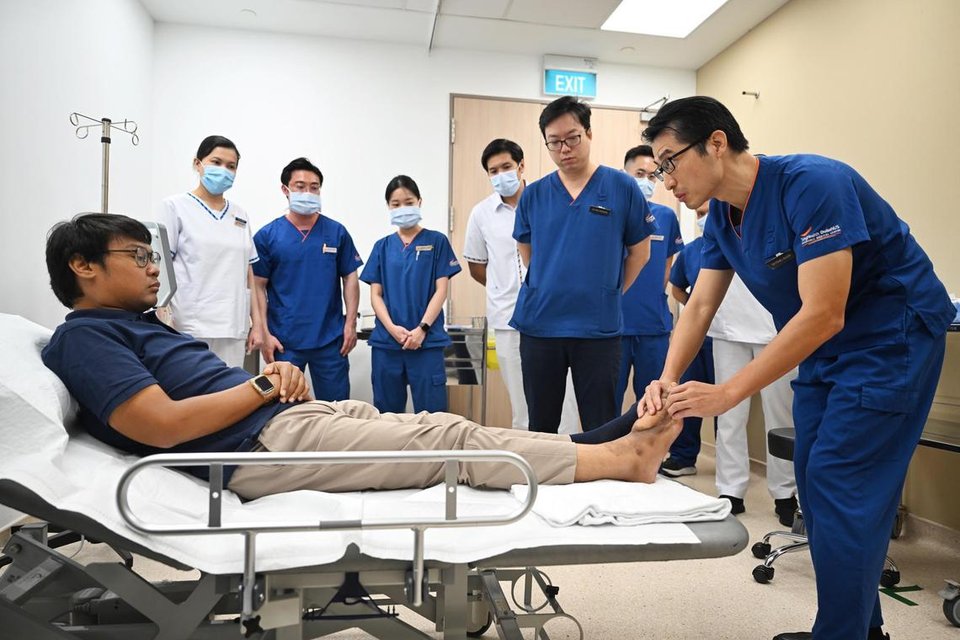Arts groups organise activities to keep seniors healthy and happy

Published on
01 Oct 2017
Published by
The Straits Times
Groups are organising drama workshops, painting classes and other arts-related activities to help older folk stay healthy
Veteran theatre-maker Catherine Sng says the older you are, the more active you need to be. That is why the 67-year-old invites people aged 50 and older to weekly drama workshops with her Glowers Drama Group.
From active seniors finding new meaning in arts and craft to dementia patients reconnecting with families through watercolour painting, the arts can offer older Singaporeans physical and emotional benefits.
Sng has acted in film and television and also devises and directs theatre. She started Glowers Drama Group in 2008 specifically to train and work with people over the age of 50.
"It's not only about performing, but it's also to keep them healthy and sharp. If I go two weeks without working, I feel sick, but it's actually because I'm depressed and lonely," she says.
Simply watching a film or going to an art exhibition, play or concert can significantly increase mental and physical health and quality of life for Singaporeans aged 50 and above, according to survey results released earlier this month.
The Arts For Ageing Well Study, funded by the National Arts Council, also showed that older Singaporeans who played music, made pottery or otherwise participated in the arts were in better physical and mental health than those who did not.
International studies have also suggested the benefits of the arts for older people.
The arts council here has long worked with eldercare agencies such as the Alzheimer's Disease Association, Tsao Foundation and Agency for Integrated Care to create arts programmes for seniors.
The Arts & Dementia programme at the Alzheimer's Disease Association's dementia daycare centres has been running since 2014. Participants, usually aged above 50, may make pottery or visit museums. They are led to take photographs and make photobooks, which helps those with failing memories remember what they have done.
The Alzheimer's Disease Association also hosts Memories Cafe sessions, which offer people with dementia and their caregivers a safe, friendly space to enjoy arts performances and make friends.
Each session lasts two hours and is attended by more than 30 people. In the first hour, participants engage in music or drama activities led by staff and volunteers - perhaps a sing-along session in English or Mandarin to ignite memories of favourite old tunes.
Ms Theresa Lee, the association's executive director, says: "We use the arts as a platform to engage persons with dementia in activities, connect them with their past experiences and to gain new skills.
"The overall goal is to increase their well-being through the arts."
At Peacehaven Nursing Home run by the Salvation Army, art therapist Joyce Tan, 62, uses watercolour painting and other visual arts techniques to help older patients with dementia find ways to express themselves.
The Memories In Making art programme was started by the Alzheimer's Association in the United States. The neurological connection between the brush-wielding hand and the brain stimulates memories.
Ms Tan provides art materials and pages from calendars as a reference to get patients painting. She has seen patients who hardly speak stimulated into talking or smiling through making art. "When they're painting, they know what they're doing. There's still growth and a sense of identity."
Making art raises patients' selfesteem and provides a way for them to connect with their families, she explains.
Art is a great unifier between the generations. Since 2012, the arts council has organised the Silver Arts Festival here, which showcases performing and visual arts and films made by people aged above 50 for their peers and families.
The most recent edition ended on Sunday and 42,000 are estimated to have attended.
This year's festival showcased mixed-media art on the topic of food, created by 50 pre-schoolers from NTUC My First Skool and 16 people from senior daycare centres under NTUC Health Silver Circle.
For next year's festival, 20 seniors are learning from professional artists to recall and tell rhymes, folktales and personal stories in their own dialects, such as Hokkien, Teochew and Cantonese. Mandarin is used as a bridging language of communication.
Ms Chua Ai Liang, the arts council's senior director for engagement and participation, says: "The arts offer opportunities for seniors to share their stories that shape our collective memories and forge stronger inter-generational understanding. This is one demographic we feel we could do more for, to encourage more arts attendance and participation."
MAKING SENIORS FEEL AT EASE TO JOIN IN
It is not as easy as inviting older people to participate in dance classes or watch a free concert. The activities in a workshop and even the location of the event must be accessible to those with some physical limitations - perhaps lowered mobility or bad eyesight.
Sng of Glowers Drama Group says: "Some of us have bad knees, but we can guide them through that. It's like yoga, don't push yourself. If you're tired or giddy, sit down. But I've seen people sit down and later when they see our games, they forget their pain and join in."
Another successful programme engaging older participants is Theatre For Seniors, launched in 2008 by local theatre troupe The Necessary Stage.
One participant, Madam Padma Krishnan, 67, has now shot TV commercials and performed on stage several times. The last was in Family Secrets, a double bill in March at Esplanade - Theatres on the Bay, during A Date With Friends festival.
Madam Krishnan says: "I'm a shy person and never realised I would enjoy performing in front of an audience. I love the theatre and now I get withdrawal symptoms without it. I look for theatre workshops to do."
She adds: "Through theatre, I forget my age and the physical things I'm unable to do. It's a caring community in theatre. You feel needed and able to contribute."
With newfound confidence, she retrained as a facilitator for children with special needs in mainstream schools. She wrote a cookbook when she turned 60 and by the time she is 70, she hopes to be in a film.
Acting also brings her closer to her three grandchildren, especially her 11-year-old grand-daughter. "My grand-daughter is a great fan. She gives me moral support. I rehearse my lines with her and she gives me feedback on how I should say them," she says.
Source: The Straits Times © Singapore Press Holdings Limited. Reproduced with permission.
ALL views, content, information and/or materials expressed / presented by any third party apart from Council For Third Age, belong strictly to such third party. Any such third party views, content, information and/or materials provided herein are for convenience and/or general information purposes only. Council For Third Age shall not be responsible nor liable for any injury, loss or damage whatsoever arising directly or indirectly howsoever in connection with or as a result of any person accessing or acting on any such views, content, information and/or materials. Such third party views, content, information and/or materials do not imply and shall not be construed as a representation, warranty, endorsement and/or verification by Council For Third Age in respect of such views, content, information and/or materials.







